Have you ever heard of the “5 elements of feng shui”? It’s an ancient Chinese practice that believes in balancing the five elements – wood, fire, earth, metal, and water – to create harmony and positive energy in your living space. Imagine walking into a room that feels perfectly balanced, where every element seems to work together in harmony, creating a sense of calm and tranquility. That’s the power of feng shui!
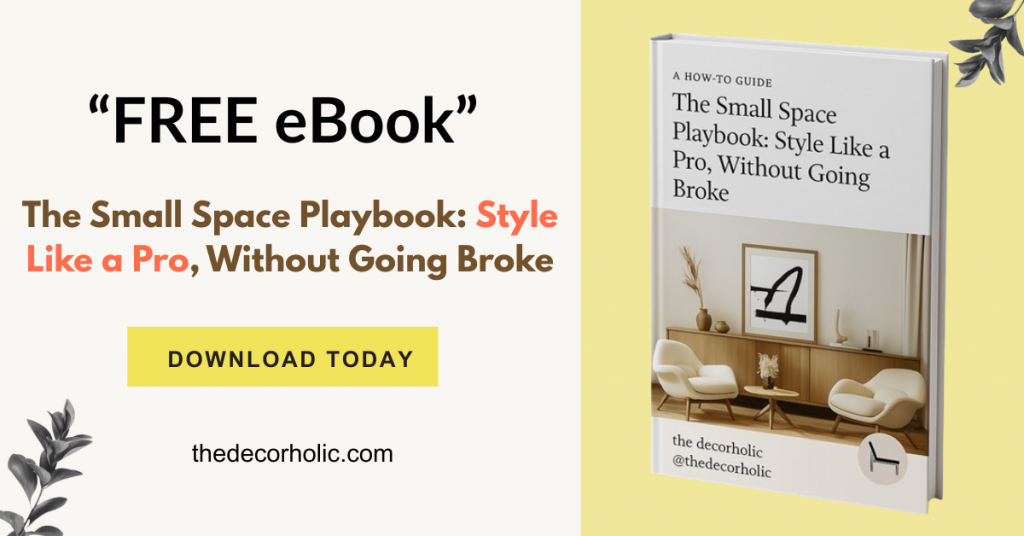
Picture this: You come home after a long, stressful day at work, but as soon as you step through the door, you’re enveloped in a warm, welcoming atmosphere that instantly melts away your worries. The room is alive with vibrant colors and natural textures, the gentle sound of a water feature in the corner soothes your senses, and the soft glow of candlelight creates a cozy ambiance. This is the magic of incorporating the five elements of feng shui into your decor.
Feng shui is more than just a decorating trend; it’s an ancient art that has been practiced for centuries to promote balance, harmony, and well-being in our living spaces. By understanding the principles behind the five elements and how to incorporate them into your decor, you can transform your home into a sanctuary that nurtures your mind, body, and soul.
I. What is Feng Shui?

Feng shui (pronounced “fung shway”) is a traditional Chinese philosophy dedicated to creating harmonious environments through strategic placement of objects, colors, shapes, and materials. Its primary goal is to harness positive energy, known as “chi” or “qi,” to enhance well-being, prosperity, and life balance.
Key Principles
- Connection of Energy: Everything in the universe is interconnected through an invisible flow of energy.
- Environmental Arrangement: By arranging our spaces according to feng shui principles, we cultivate harmony and balance.
- Impact on Well-being: Proper feng shui can significantly influence physical, mental, and emotional health.
- Simplicity at Core: The essence of feng shui is about creating environments that nourish our spirits and align with our unique energy and needs.
Pro Tip: Start by decluttering your space to create a clean slate for positive energy flow (chi/qi), enhancing harmony and well-being.
Also: How To Make The Bed Like A Hotel
II. Understanding the Five Elements of Feng Shui

The five elements of feng shui are like the building blocks of a harmonious and balanced life. Each element represents different energies and qualities that work together to create a sense of flow and tranquility. Let’s break them down:
1. Wood (Growth, Vitality)
The wood element is all about growth, new beginnings, and fresh energy. It’s like the little seed that sprouts and grows into a mighty tree. In feng shui, wood represents qualities like flexibility, strength, and vitality.
2. Fire (Passion, Energy)
The fire element is the spark that ignites our passions and drives us forward. It’s the warmth and energy that keeps us motivated and inspired. In feng shui, fire represents qualities like enthusiasm, courage, and transformation.
3. Earth (Stability, Nourishment)
The earth element is the solid foundation that grounds us and provides stability. It’s the nurturing energy that helps us feel safe and secure. In feng shui, earth represents qualities like patience, endurance, and reliability.
4. Metal (Clarity, Focus)
The metal element is the sharp, precise energy that helps us cut through the clutter and find clarity. It’s the focus and determination that keeps us on track. In feng shui, metal represents qualities like efficiency, discipline, and precision.
5. Water (Fluidity, Renewal)
The water element is the flowing, ever-changing energy that represents renewal and purification. It’s the fluidity and adaptability that helps us go with the flow. In feng shui, water represents qualities like wisdom, compassion, and spirituality.
By understanding the unique qualities and energies of each element, you can start to incorporate them into your decor in a balanced and harmonious way.
Pro Tip: Recognize that each element brings unique energy: Wood for growth, Fire for passion, Earth for stability, Metal for clarity, and Water for renewal. Balance them to create a dynamic and harmonious environment.
Also: Wabi Sabi Bedroom: A Step-by-Step Guide
1: Incorporating the Wood Element in Your Decor

Did you know that the wood element in feng shui represents growth, vitality, and new beginnings? It’s like the fresh buds on a tree in spring, bursting with energy and potential. Bringing the wood element into your home can help you feel more alive, inspired, and ready to take on new challenges.
Here are some fun and easy ways to add a touch of wood to your decor:
Use natural materials like bamboo, rattan, or wood furniture
These materials have a warm, earthy vibe that instantly makes a room feel cozier and more inviting. Plus, they’re super sturdy and long-lasting, just like a strong, healthy tree!
Add potted plants or fresh flowers
Houseplants are like little buddies that help purify the air and add a pop of green to any room. Bonus points if you choose plants with wooden stems or branches, like a lucky bamboo plant!
Incorporate green or brown color accents
Green, symbolizing nature, beautifully represents the wood element in feng shui. Incorporating green through throw pillows, curtains, or an accent wall can refresh your space with vibrancy. Brown is also an excellent choice, evoking the sturdy essence of tree trunks and bark.
Benefits of Incorporating the Wood Element
- Sense of Growth: Enhances feelings of renewal and vitality in your environment.
- Promotes Harmony: Creates a balanced and peaceful atmosphere at home.
- Inspiration for Creativity: May encourage you to pursue new hobbies or projects you’ve been considering.
Pro Tip: Introduce live plants or wooden furniture to foster growth and vitality, bringing a sense of renewal and inspiring creativity in your space.
Trending: How To Decorate Dark Feminine Bedroom
2: Bringing in the Fire Element

Shop on Amazon: Boucle Couch
Can you feel the warmth and energy of the fire element? It’s like sitting around a cozy campfire, letting the flames crackle and dance before you. The fire element in feng shui is all about passion, enthusiasm, and transformation.
Here are some sizzling ways to incorporate the fire element into your decor:
Use warm colors like red, orange, or purple
These bold, vibrant colors instantly add a burst of energy to any room. Imagine how a bright red accent wall or a few orange throw pillows can make a space feel alive and invigorating!
Incorporate candles or fireplaces
There’s nothing quite like the gentle flickering of candlelight or the crackling of a real fireplace to create a cozy, inviting atmosphere. The dancing flames represent the constant flow of energy and transformation.
Add bold, vibrant artwork or accessories
Incorporate bold, fiery colors, abstract shapes, or imagery of flames and the sun to represent the fire element in your space. These vibrant accents can help ignite your creativity and inspire you to pursue your passions.
Benefits of the Fire Element
- Energized Environment: Infusing your home with the fire element creates a space that feels passionate and ever-changing.
- Inspiration for New Experiences: The dynamic energy of the fire element may encourage you to try something new or tackle an exciting project you’ve been considering.
- Stimulation of Creativity: The fire element’s vivacious presence can help stimulate your creativity and drive you to explore your interests.
Pro Tip: Use warm colors like reds or oranges, or add candles and fireplaces to ignite passion and energy, creating an energized and stimulating atmosphere.
Also: How To Start Organizing A Messy House: 15 Most Popular Decluttering Methods
3: Grounding with the Earth Element

Ah, the earth element – it’s like a warm hug from Mother Nature herself! This element represents stability, nourishment, and a deep connection to the natural world around us. Just like the solid ground beneath our feet, the earth element in feng shui helps us feel grounded, secure, and at peace.
Here are some down-to-earth ways to incorporate the earth element into your decor:
Use earthy tones like beige, yellow, or terracotta
These colors remind us of fertile soil, golden fields of wheat, and the warm embrace of the sun. They create a cozy, inviting atmosphere that instantly makes you want to kick off your shoes and relax.
Incorporate ceramics, clay, or stone decor
From a rustic pottery vase to a sleek marble coffee table, these natural materials connect us to the earth’s rich textures and colors. Plus, they’re super durable and long-lasting, just like the earth itself!
Add a cozy rug or comfortable seating
Imagine sinking into a plush, oversized armchair or wiggling your toes into a soft, earthy-toned rug. These elements promote relaxation, coziness, and self-nurturing—mirroring how the earth nourishes all living things.
Benefits of the Earth Element
- Stability and Comfort: Incorporating the earth element creates a stable and comforting atmosphere in your home.
- Grounding Experience: Enhances feelings of being grounded and connected to nature.
- Tranquil Environment: Provides a little slice of nature’s tranquility right in your living space, encouraging relaxation and well-being.
Pro Tip: Incorporate earthy tones (beige, yellow) and natural materials like ceramics or stone to create a sense of stability and comfort, grounding your space with tranquility.
Also: How to Choose a Wall Color: A No Fail Formula
4: Enhancing with the Metal Element

Can you hear that crisp, clear sound? It’s the metal element ringing through, representing qualities like focus, clarity, and precision. Just like a finely crafted sword or a shiny set of wind chimes, the metal element in feng shui helps cut through the clutter and brings a sense of order to our lives.
Here are some shiny ways to incorporate the metal element into your decor:
Use metallic accents like silver, gold, or stainless steel
These sleek, modern materials add a touch of sophistication and elegance to any room. Imagine how a few well-placed metallic vases or a gorgeous gold-framed mirror can make a space feel polished and put-together.
Incorporate mirrors or reflective surfaces
Mirrors are like magical portals that bounce light around a room, creating a sense of spaciousness and clarity. Plus, they represent the metal element’s ability to reflect and provide insight.
Add geometric shapes or streamlined furniture
Clean lines, sharp angles, and minimalist designs exemplify the metal element’s affinity for structure and precision. A stylish metal side table or a set of geometric bookends can introduce a sense of order and sophistication to your space.
Benefits of the Metal Element
- Focus and Organization: Incorporating the metal element fosters a focused and organized environment.
- Purposeful Atmosphere: Creates a purposeful space that encourages clarity and efficiency.
- Personal Zen Oasis: Acts as a sanctuary for decluttering your mind, helping you find the clarity needed to tackle challenges with confidence.
Pro Tip: Utilize metallic accents (silver, gold) and reflective surfaces to promote clarity and focus, fostering an organized and purposeful environment.
Also: How To Set Up A Small Home Gym
5: Embracing the Water Element
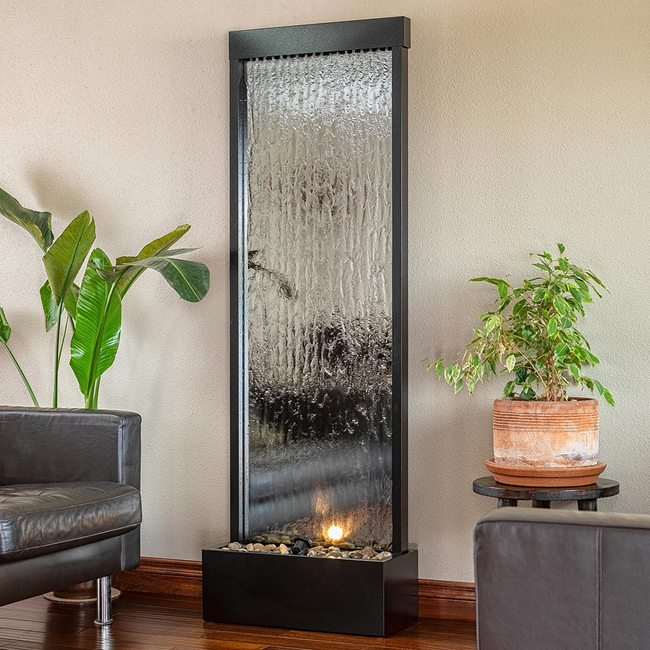
Shop on Amazon Indoor Waterfall Fountain
Can you hear the gentle sound of trickling water? That’s the soothing energy of the water element, representing fluidity, renewal, and wisdom. Just like a bubbling stream or a serene lake, the water element in feng shui encourages us to go with the flow and embrace change.
Here are some refreshing ways to incorporate the water element into your decor:
Use shades of blue or black
These cool, calming colors remind us of deep oceans and peaceful nights under a starry sky. Imagine how a rich navy blue accent wall or a few black throw pillows can create a sense of tranquility and depth in a room.
Incorporate water features like fountains or aquariums
Nothing quite captures the essence of the water element like the real thing! The gentle sound of running water is incredibly soothing and can help wash away stress and tension. Even a small desktop fountain or a beautiful fish tank can bring a sense of serenity to your space.
Add curved or flowing lines in your decor
From a graceful, serpentine-shaped vase to a plush, wavy-patterned rug, these fluid designs mimic the water element’s natural ebb and flow. They encourage a sense of flexibility and adaptability in your living space.
Benefits of the Water Element
- Tranquil Environment: Embracing the water element creates a serene and rejuvenating atmosphere.
- Ever-Evolving Space: Encourages an adaptable environment that reflects change and growth.
- Personal Oasis: Provides a sanctuary where you can release stress and connect with your inner wisdom and creativity.
Pro Tip: Add blue or black hues, and include water features or curved lines to encourage fluidity and renewal, creating a serene and adaptable personal oasis.
Also: Aesthetic Work Desk Setup Ideas

III. Pulling it together with All 5 elements

Now that you understand the unique energies and qualities of each element, it’s time to bring them all together in perfect harmony. Just like a beautifully composed symphony, the key is to strike the right balance and create a cohesive flow.
Here are some tips for integrating all five elements seamlessly into your decor:
Start with a focal point
Choose one element that resonates most with you or the room’s purpose, and make that the focal point. For example, a cozy reading nook might have the earth element as its grounding foundation.
Layer in complementary elements
Once you’ve established your focal point, layer in the other elements in a way that complements and balances the space. Continuing with our reading nook example, you could add a wooden bookshelf (wood), a metal lamp (metal), a crackling fireplace (fire), and a small water feature (water).
Use the Bagua map
The bagua map is a feng shui tool that assigns each area of your home to one of the five elements. By decorating according to the bagua, you can ensure a harmonious flow of energy throughout your space.
Pay attention to placement and proportion
The positioning and proportion of each element are crucial for creating a sense of balance. Avoid overcrowding or overemphasizing any one element, as this can disrupt the energy flow.
Trust your intuition
While there are guidelines to follow, ultimately, feng shui is about creating a space that feels right for you. Trust your intuition and choose decor elements that resonate with your personal style and energy.
Benefits of Combining the Five Elements
- Balanced Environment: Thoughtfully integrating all five elements—wood, fire, earth, metal, and water—cultivates a balanced and harmonious living space.
- Nurturing Atmosphere: Creates an environment that nurtures your mind, body, and soul, supporting overall well-being.
- Personal Connection: Encourages a personal connection to your space, making it a true reflection of who you are and what you value.
Pro Tip: Use the Bagua map to strategically place elements, ensuring balance and proportion while trusting your intuition to create a truly personalized and harmonious living space.
IV. Feng Shui for Specific Rooms: Harmonizing Your Home, Room by Room
Applying the elements of Feng Shui to your entire home can feel overwhelming, but breaking it down room by room makes the process much more manageable and impactful. Each space in your home serves a unique purpose and therefore benefits from specific Feng Shui considerations to optimize its energy for its intended function.
The Bedroom: A Sanctuary for Rest and Relationships

The bedroom is arguably the most crucial room for personal well-being in Feng Shui. It’s your sanctuary for rest, rejuvenation, and intimate relationships. The goal here is to create a peaceful, supportive, and balanced environment that encourages deep sleep and harmonious connections. The elements of Feng Shui for a bedroom often lean towards calming energies.
Key Feng Shui Goals: Promote restful sleep, enhance emotional and physical intimacy, and support personal well-being.
A 2018 study published in the journal Sleep Health found that bedroom aesthetics, including clutter levels and perceived coziness, significantly impact sleep quality and duration. Participants who rated their bedrooms as more comfortable and aesthetically pleasing reported better sleep.
Pro Tip: Place your bed in the “command position”—facing the door but not directly in line with it, with a solid wall behind it. This provides a sense of security and support. Minimize electronics and clutter, and use soft, earthy colors (Earth element) or blues (Water element) for tranquility.
The Home Office: Cultivating Productivity and Career Growth

With the rise of remote work, the home office has become a critical space. In Feng Shui, this room directly influences your career, productivity, and financial abundance. Creating an inspiring and focused environment through the thoughtful application of the elements of Feng Shui can truly support your professional aspirations.
Key Feng Shui Goals: Enhance focus, boost productivity, foster creativity, and attract career opportunities.
“Your environment should be an extension of your intention.” – Karen Rauch Carter, best-selling author of Move Your Stuff, Change Your Life. This quote perfectly encapsulates the idea that a well-designed office, guided by Feng Shui, should align with your professional goals.
Pro Tip: Position your desk in the command position, facing the door. Incorporate the Wood element with plants to stimulate growth, and the Metal element with organized, clutter-free surfaces for clarity. Ensure good lighting and comfortable seating.
The Kitchen & Dining Area: Nourishment, Health, and Abundance

The kitchen is the heart of the home, representing health, nourishment, and wealth. How you maintain and organize this space, using the elements of Feng Shui, can directly impact the well-being and prosperity of your household. The dining area further extends this energy, promoting connection and abundance.
Key Feng Shui Goals: Promote good health, encourage family harmony, and symbolize financial abundance.
“The health of your home and the health of your body are intrinsically linked.” – Annette Kurtz, author of Harmonize Your Home. This underscores the profound connection between a well-balanced kitchen and overall family well-being.
Pro Tip: Keep your kitchen immaculately clean and organized, especially the stovetop, which represents wealth. Ensure the Fire and Water elements (stove and sink) are not directly opposite each other, or place a wooden element between them to mediate. Display fresh fruit or flowers to symbolize abundance.
The Living Room: Fostering Connection and Social Harmony

The living room, often the central hub of a home, is where families gather, friends connect, and relaxation happens. In Feng Shui, this space is vital for fostering social harmony, positive interactions, and a sense of shared well-being. Balancing the elements of Feng Shui here can create a welcoming and comfortable atmosphere for everyone.
Key Feng Shui Goals: Encourage open communication, foster social connections, promote relaxation, and gather positive family energy.
Research from the American Society of Interior Designers (ASID) consistently highlights that well-designed common areas in homes lead to increased social interaction, reduced stress, and enhanced overall occupant satisfaction. While not specific to Feng Shui, this strongly supports the benefits of creating a harmonious living room environment.
Pro Tip: Arrange furniture to encourage conversation, such as placing sofas and chairs in a U-shape or an octagon (Bagua shape) around a central coffee table. Ensure clear pathways for easy movement. Use soft lighting (Fire element) and comfortable textures (Earth element) to create a warm and inviting ambiance.
The Entryway: Welcoming Opportunities and Positive Chi

The entryway, or foyer, is the “mouth of chi” for your entire home. It’s where energy enters and sets the tone for your space and your life. A well-designed entryway, aligned with the elements of Feng Shui, invites positive opportunities, health, and prosperity into your home.
Key Feng Shui Goals: Attract positive chi, create a welcoming atmosphere, and symbolize new opportunities.
Pro Tip: Keep the entryway clear of clutter. Ensure it’s well-lit and inviting. Add a vibrant plant (Wood element) for growth or a beautiful piece of art that inspires you. A mirror placed strategically (not directly facing the door) can expand the space and reflect positive energy.
Also: 7 Ways to Create a Beautiful Color Palette For Your Home

V. Feng Shui Home decor Best Finds
If you’re craving a home that feels incredible—a true sanctuary where peace and positive energy flow freely—then this is your roadmap. I’ve curated furniture and decor designed to harness the ancient power of Feng Shui, transforming your rooms into hubs of balance and vitality.
Every item here is an investment in your well-being, meticulously selected to make the dream of a beautifully harmonious space effortlessly within reach. Featuring selections from trusted brands like Allmoder, Gus Modern, and Joss & Main, you’re sure to find the perfect piece of furniture to complete your Feng Shui home.
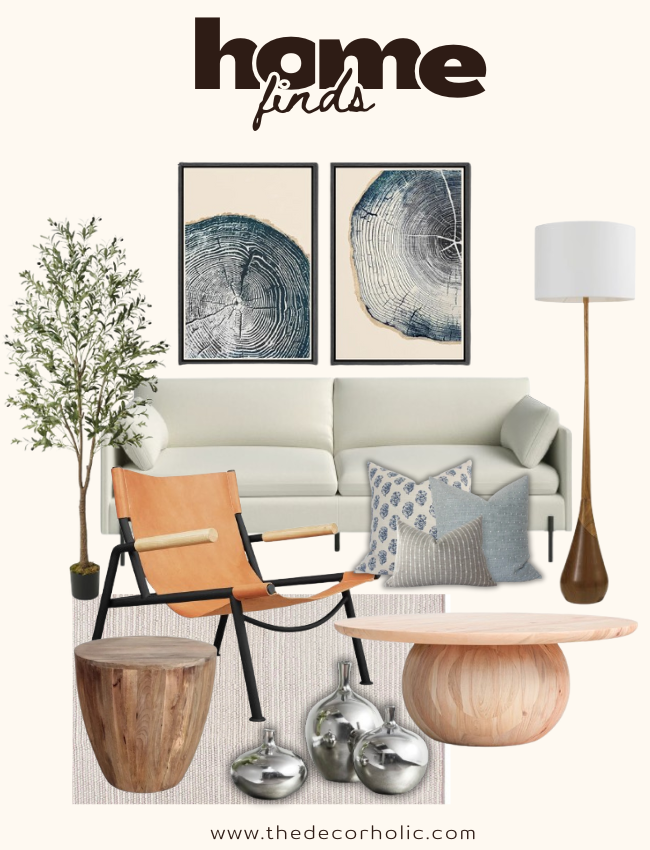
Ready to refresh your space? Shop my top decor picks below and instantly elevate your home’s style!
2 Piece Wall Art | Faux Olive tree | Modern Sofa | Modern Floor Lamp | Leather Sling Chair | Throw Pillows (set of 3) | Natural Wood Side Table | Modern Coffee Table | Neutral Wool Area Rug (10×8) | Metal Vases (set of 3)
VI. Feng Shui Common Mistakes to Avoid
While understanding the elements of Feng Shui is the first step towards creating a harmonious home, it’s equally important to be aware of common pitfalls. Misapplying these ancient principles can inadvertently create stagnant or negative energy, undermining your efforts to optimize your space. Avoiding these errors ensures that your efforts truly enhance your environment and well-being.
Overlooking the Front Door
Your front door is considered the “mouth of chi” – where energy enters your home. Neglecting it is a significant oversight in Feng Shui. A cluttered, dirty, or uninviting entryway can deter positive energy (and opportunities) from flowing in. Ensure it’s well-lit, clean, and has a clear path.
- Pro Tip: Regularly clean your front door and entryway. Consider adding a vibrant plant or a welcoming doormat to invite positive chi. Ensure nothing blocks the door from opening fully.
Mirror Placement Gone Wrong
Mirrors are powerful tools in Feng Shui for moving energy and expanding space, but their improper placement can cause issues. Reflecting clutter, a toilet, or even your bed (which can disrupt sleep) are common mistakes.
- Pro Tip: Use mirrors strategically to reflect beautiful views, natural light, or to visually expand a small space. Always ensure they reflect something positive and uplifting. Avoid placing mirrors directly opposite the main entrance or at the foot of your bed.
Excessive Clutter and Stagnant Energy
This is perhaps the most fundamental and frequently overlooked aspect of Feng Shui. Clutter creates stagnant energy, blocks chi flow, and can lead to mental and emotional congestion. Even if you incorporate all the elements of Feng Shui perfectly, a cluttered space will negate many benefits.
Laura Benko, author of The Holistic Home, states, “Clutter creates stagnant energy. When you are stagnant, there is little growth happening, and you will tend to either live in the past and feel sad or live in the future and feel anxious.” This emphasizes the profound impact clutter has on your well-being.
Ignoring the Command Position
In Feng Shui, the “command position” refers to the spot in a room that gives you a clear view of the door without being directly in line with it. This is crucial for beds, desks, and stoves as it provides a sense of security and control. Not placing these items in the command position can lead to feelings of vulnerability or lack of control.
- Pro Tip: Position your bed so you can see the door but are not directly in line with it. Similarly, for your desk or stove, ensure you have a commanding view of the entrance to the room.
Over-Emphasis on One Element
While focusing on bringing a specific element into a room (e.g., more Wood in a home office for growth) is good, overdoing any one element can create imbalance. Too much Fire can lead to aggression, too much Water to melancholy, and so on. Balance is key in all elements of Feng Shui.
A 2009 study by the UCLA Center on Everyday Lives and Families (CELF) found that women who described their homes as “cluttered” had significantly higher levels of the stress hormone cortisol throughout the day compared to those who described their homes as “restful.” This research highlights the tangible negative impact of disorganization, a core issue addressed by Feng Shui.
Pro Tip: After adding a dominant element, assess the room’s overall feel. Use the Sheng Cycle (productive cycle) and Ko Cycle (controlling cycle) to balance elements. For instance, if you have too much Fire, introduce Earth (absorbs Fire) or Water (controls Fire).
Most Popular Post:
10 Surprising Benefits of Printable Wall Art
How to Choose The Right TV Size to Decorate Your Living Room
The ultimate Smart Home Design Guide: Automate your life
Tips for Home Decorating on a Budget: Where to Splurge and Save
10 Best Couch Colors That Make a Room Look Bigger
Conclusion
By incorporating the five elements of feng shui into your decor, you’re not just creating a visually stunning space – you’re cultivating an environment that nurtures your well-being and promotes harmony in all aspects of your life. Whether you’re drawn to the grounding stability of the earth element, the passionate energy of fire, the fluidity of water, the clarity of metal, or the growth potential of wood, there’s an element that speaks to your unique needs and desires.
- Key to Successful Feng Shui: Find a balanced representation of all five elements.
- Like a delicate dance, each element complements and enhances the others.
- Thoughtfully incorporate natural materials, colors, shapes, and textures that embody these elements.
- Create a living space that feels like a true sanctuary—an environment for recharging, finding inspiration, and embracing life’s ebbs and flows with grace and ease.
- Get Creative: Let the ancient wisdom of feng shui guide you in crafting a home that nurtures your soul.
- You may be surprised at how a few simple decor changes can transform your space and uplift your entire being!
Decorating with the 5 Elements of Feng Shui-FAQs:
Q: Do I need to follow feng shui principles strictly, or can I adapt them to my personal style?
A: Feng shui is all about creating a space that feels authentic and aligned with your unique energy. While there are guidelines to follow, the most important thing is to trust your intuition and incorporate the elements in a way that resonates with you. Don’t be afraid to put your personal spin on things!
Q: I live in a small apartment. Can feng shui still work for me?
A: Absolutely! Feng shui principles can be applied to spaces of any size. In fact, it can be especially helpful in creating a sense of balance and flow in smaller spaces. Get creative with multi-functional pieces and strategic placement to make the most of your square footage.
Q: How often should I make adjustments to my feng shui decor?
A: It’s generally recommended to re-evaluate your feng shui setup every few months or whenever you experience significant life changes or transitions. This helps ensure that your living space remains in harmony with your current needs and goals.
Q: Can I mix different styles or eras when incorporating the five elements?
A: Definitely! Feng shui is all about finding a harmonious balance, so feel free to mix and match different design styles or eras as long as the overall energy flow feels cohesive and balanced. The key is to choose pieces that truly resonate with you and the elements you’re trying to incorporate.
Subscribe To News Letter!
Subscribe now for an endless feed of inspirational women’s cave decor ideas, pampering rituals, and more tips for curating your ultimate escape. Let’s get started on making your cozy refuge a reality – you so deserve this!
CATCH THE LATEST IN HOME DECOR TRENDS:

Steal These 16 Expert-Approved Decorating Secrets

How To Accessorize Your Living Room
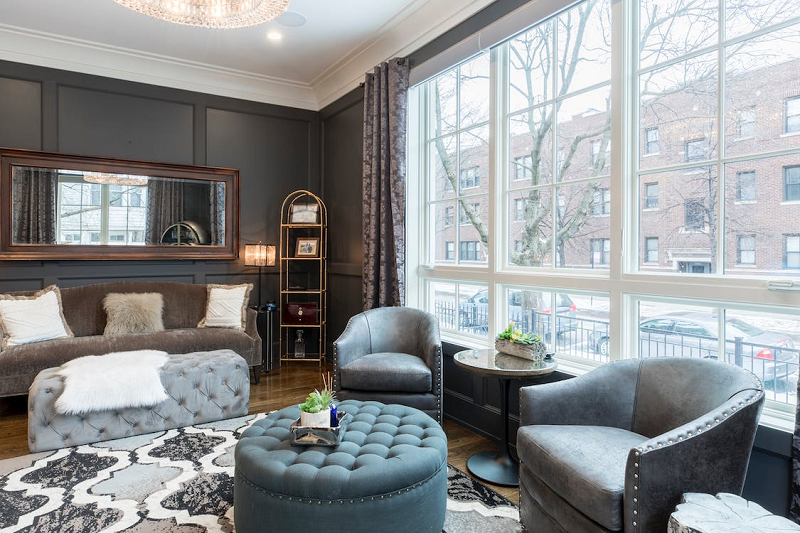
Small Space? 10 Ways To Make A Room Appear Bigger
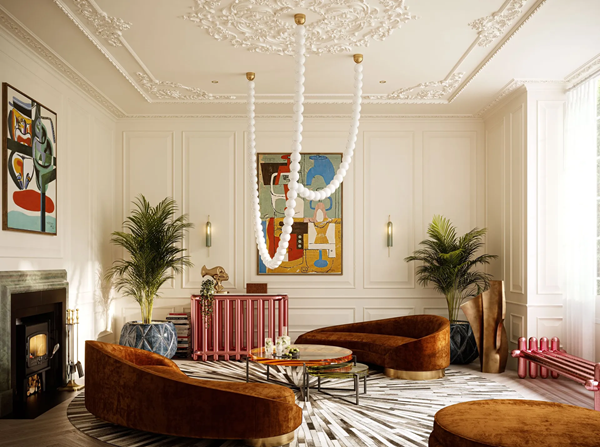
Make Your space Look Expensive
GET CAUGHT UP ON ALL THE INSPIRING DECOR TIPS:
[pt_view id=”8f2eadfyql”

